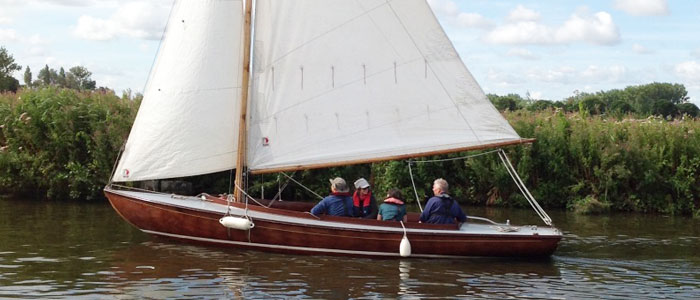I was never what you would call a sporty student. I did my very best to arrange clarinet tuition in the middle of games lessons, and I was much happier in libraries, music rooms and theatres. Since then, I’ve become a fairly competent cyclist and hiker but I still retain a belief that I can’t ‘do sport’. So, it was with some trepidation that I found myself at a traditional boatyard in Norfolk, England, learning to sail on beautiful vintage wooden boats.
I had been out a couple of times on a friend’s boat, but any advantage this gave me only lasted for about half an hour. It was with the familiar sense of inferiority that I saw my fellow students apparently succeeding immediately, whilst I struggled to even grasp which direction the wind was coming from! l. By the middle of the week, I was almost ready to give up and go home. There was so much new information to process and the gap seemed too huge between where I wanted to be and where I was. At that point, I totally understood what it felt like to be the student who stops engaging with their lessons to hide the fact that they don’t feel they can do well. “Oh well”, I thought, “what did I expect? I’ve always been rubbish at this kind of thing. Why did I think this time would be different?”
“The only problem you’ve got is in your head”, said our instructor. “You don’t believe you can succeed, and you are so stressed about doing well right now that you aren’t prepared to make any mistakes. You need to focus on what you want to achieve at the end of week. If you won’t make mistakes now, you won’t improve.” Suddenly I realised that I was experiencing, from a student’s perspective, exactly the kind of thing I dealt with all the time as a History Teacher and Head of Sixth Form. I have spent hours encouraging students to try things out in their term-time history essays. I would explain that some of their attempts might result in a lower mark but that if they keep going, the risks they take will eventually result in arguments which are relevant, analytical and supported by excellent evidence (and possibly even be incisive and original).
Gordon Stobart is a keynote speaker at this year’s Cambridge Schools Conference. In his book, ‘The Expert Learner’, he challenges the myth that people are born with fixed abilities. Instead he emphasises the role of factors such as extensive practice, self-belief, and the willingness to make mistakes in the pursuit of excellence.
He says that, “For those wanting to excel, failure is an essential part of training, from which we can often learn more than from routine success” ¹. As teachers, we need to support our students in understanding this, helping them to get out of their comfort zone, not so far that they panic, but enough that they are able to make progress. Stobart calls this the Learning Zone ², and encourages us to create “a culture in which getting something wrong is seen as productive rather than a humiliation ³.’’ The more that we help our students to develop the confidence to persevere, to be willing to make mistakes, and to be reflective enough to learn from these, the more we can help them to make progress.
 For me, a mixture of fear of failure and a lack of belief in myself was holding me back. However, here I was with instructors who had faith in me, and helped me to realise that the only thing stopping me succeed was my lack of confidence. Once they had helped me to realise this, I was able to respond to their coaching, to try things out, to make mistakes, and to improve. At the end of the week, we all passed the course, and all six of us are now impatient to get back on the water, to practise, to challenge ourselves and to learn more.
For me, a mixture of fear of failure and a lack of belief in myself was holding me back. However, here I was with instructors who had faith in me, and helped me to realise that the only thing stopping me succeed was my lack of confidence. Once they had helped me to realise this, I was able to respond to their coaching, to try things out, to make mistakes, and to improve. At the end of the week, we all passed the course, and all six of us are now impatient to get back on the water, to practise, to challenge ourselves and to learn more.
This is so often the same for our students. Sometimes they have grown up being made to believe that they don’t have the ability to succeed in a particular area. As teachers, we can encourage students to persevere and be prepared to make mistakes. We can coach them in the skills they need to achieve so much more than they thought possible.
I am reminded of a postcard I used to have in my office and which I showed students who were feeling demoralised by a setback. It said simply, “I’ve learnt so much from my mistakes, I’m thinking of making a few more.” I think I need to find it and put it on my fridge, to remind myself of this wisdom next time I‘m tempted to give in.
¹ Stobart, Gordon, The Expert Learner, Challenging the Myth of Ability, Open University Press, McGraw Hill, Maidenhead, 2014 p50
² Stobart, Gordon, The Expert Learner, Challenging the Myth of Ability, Open University Press, McGraw Hill, Maidenhead, 2014 p51
³ Stobart, Gordon, The Expert Learner, Challenging the Myth of Ability, Open University Press, McGraw Hill, Maidenhead, 2014 p161
Anna took an RYA Level 1 and 2 sailing course at Hunter’s Yard, Ludham, Norfolk. She is grateful to them not only for permission to use pictures of their boats but for making her put into practice as a learner what she is always saying as a teacher.





